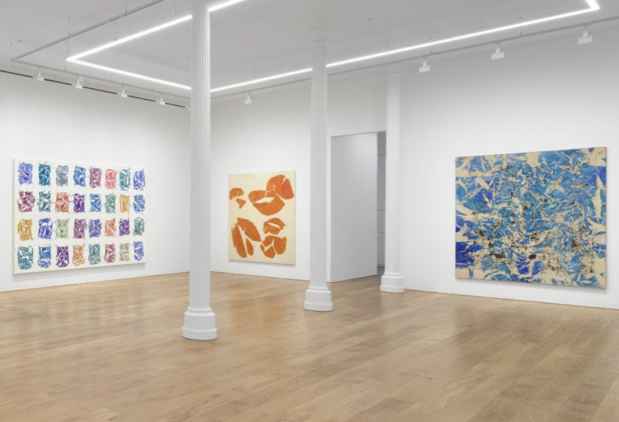Simon Hantaï “Unfolding”
Timothy Taylor

This event has ended.
Timothy Taylor presents Unfolding, an exhibition of paintings by Simon Hantaï (1922–2008), many of which have not been previously shown in the United States. Curated by Molly Warnock in our New York gallery, this presentation features eleven canvases spanning more than two decades, offering a nuanced and comprehensive view of the Hungarian-born French painter’s innovative body of work.
Simon Hantaï is best known for the abstract canvases he created using his pliage, or “folding,” method, in which the artist painted knotted, folded, or crumpled canvas before unfolding and then stretching it for exhibition. The resulting paintings feature passages of color fragmented by zones of unpainted or underpainted canvas. With this folding technique, the artist sought to make painting “banal” or, more explicitly, an expression of the materials of paint and canvas. Hantaï’s method is widely understood to link the gestural tendencies of the late 1940s and ’50s with the analytic abstraction of the later ’60s and ’70s. But, as Molly Warnock observes, “Hantaï’s paintings bear witness to a more complicated intermingling of intentionality and contingency, decision and dissemination, than the prevailing narratives acknowledge.”
At Timothy Taylor, two paintings situated at the gallery’s entrance bracket the evolution of Hantaï’s practice, as the artist moved from an appeal to metaphysical forces beyond the canvas towards an engagement with unpredictability and possibility through simple studio procedures. To create the first work, from 1958, he scraped pigment from a canvas which had been painted black. The ovoid gesture that results relates to the postwar era’s rhetoric around the void and negation, yet reveals the artist’s hand. Warnock notes that in his work of this period, Hantaï questioned “What would it mean to see gestural painting as something other than the manifestation of a unique personality?”
The second painting from 1972 is a field of shattered circular blue forms that evinces the artist’s answer to this inquiry. To produce this buoyant example of pliage, Hantaï tied off bud-shaped pouches of canvas, which he painted blue before stretching the canvas. Newly planar, the forms appear fractured by the unpainted folds. This broken effect results not from an enigmatic power, but from the unremarkable way the canvas behaves under ordinary circumstances.
Unfolding also foregrounds the diversity among and within the artist’s various pliage series. Three significant suites are represented here, each with its own terms and set of procedures. Among them are paintings from the inaugural pliage series, Mariales (1960–62), featuring allover surfaces with interplays of opaque painted facets and bare canvas or underpaintings of black drips. A brilliant orange work from the Meuns (1967–68) exemplifies Hantaï’s decisive engagement with the white of the canvas as a definitive form in itself. Finally, four canvases from the long-running Tabulas (1972–82) are characterized by comparatively regular grids of organized yet broken color. Viewed together, these paintings demonstrate the ways in which Hantaï opened his practice up to endless variation and material contingency.
As Warnock suggests, Hantaï’s formal preoccupations became mechanisms for thinking through the dynamics of self and other, individual and community. In the artist’s hands, the “banal” represents that which we hold in common, and he embraced it as such.
Accompanied by an incisive new essay by Warnock, Unfolding emphasizes the ways in which this extraordinary body of work continues to reveal itself anew.
A public conversation with Warnock and artists Sarah Crowner and David Reed will take place at the gallery on Wednesday 21 February at 6pm.
Media
Schedule
from January 25, 2024 to March 02, 2024
Opening Reception on 2024-01-25 from 18:00 to 20:00